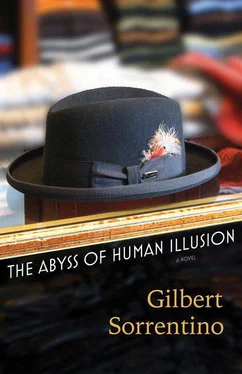This is, as suggested, not much of a story, although another writer, Henry James for an ideal instance, might be attracted to its small cruelties and faint ironies and take it on.
Steve had subscribed to the New Yorker for some seven or eight years, and doggedly read all the fiction in every issue, trying to absorb and internalize, I suppose is a just word, the strained sophistication of the prose, its nervous hipness, aloof disingenuousness, its remote, somewhat bored whimsy. It goes without saying, perhaps, that he had “submitted” his own stories, they were many, to the magazine for five years, faithfully sending a story out on the day after he got one back, its rejection slip clipped to his beautifully printed-out “stuff,” as he called his work. There was never a note, encouraging or otherwise, written on the slips; for that matter, it was my fantasy that the rejection slips were attached to the papers in a strangely dissociated way, that they had somehow found the stories and seized upon them as prey: no human agency seemed ever to have been involved. I once suggested that he send his stories to a magazine that was, well, not as impressed with itself but he gave me, as it is said, a look.
I sometimes wanted to tell him my own opinion of the magazine’s fiction, but never did, for it is not possible to use the phrase “a New Yorker story,” without its devotees hustling to the journal’s defense, smirking at one’s gauche ignorance, and telling — and telling again — the offending and pitiable ignoramus that there is no such thing as a New Yorker story, that there might have been, years ago, such a thing, but that now — look, just look! — Hip and Engaged and Transgressive and Absolutely Unexpected, brékékékék koáx koáx, and just plain Well Written! They wouldn’t publish Faulkner for Christ’s sake! Not their sort of thing.
So I said nothing; on the contrary, I took notes on certain stories, on certain phrases, on bright wise similes, so that Steve and I could discuss their subtleties. I don’t know why I did this, save that I was feeling a little bad for him. One day, the latest issue had a story in it written by a young woman who had been, ten years earlier, in a writing workshop with Steve at the New School. Steve read the story three or four times that first day, turning to look at the author’s name — Joye Lapidus — again and again, her name in that “beautiful, beautiful” New Yorker typeface. It is beautiful, I said, classic, traditional, aristocratic, really. Look at the “e” in “Joye.” He nodded, and I knew he was seeing “Steven.”
The old man knew he was dying. The doctor had come after an episode of terrible agony that he’d endured that morning, and after the briefest of looks at his patient, who twitched and writhed and rocked in pain, he said that he wanted him admitted to the hospital immediately. But the stubborn old fool refused to go in an ambulance, and the doctor, who knew his catalog of neuroses and prejudices and insanities virtually by heart, said that he’d drive him in his car, which was parked right in front of the building. “I’ll not have the horse’s ass gawms staring at me in an ambulance, by Jesus,” the old man said. “Goddamned fools and creeping Jesus Lutherans, may God damn them to hell.”
He asked the doctor to go down and wait in his car, he’d be right down, he wanted to put on some clothes, he’d be goddamned if he’d leave the house in his pajamas like some shanty Irish greenhorn. The doctor told him not to be too long, then repeated this information accompanied by a pointing and admonishing index finger, and left.
The old man put on a starched white shirt, a dark-blue tie with a small light-blue paisley figure on its ground, an Oxford gray shadow-striped suit with vest, black shoes and black silk socks, and a gray homburg. Then he left, with his daughter, who had been standing, during the doctor’s visit, in the kitchen, looking out at the neighboring roof. She didn’t want to have this sick father, she didn’t want to have this dead father, she didn’t want to have to be alive to put up with this. But here she was; with this mean, dying old man. She was afraid and relieved that he’d probably not recover this time.
On the landing between the ground and second floor, the old man stopped, stood straight for a moment, then bent over and vomited black, grainy blood, once and then again. He wiped his mouth with his handkerchief, then inspected his shoes and trouser cuffs for stains. “You’d better clean this mess up, Skeezix,” he said, “the Scowegian will have a fit and you’ll never hear the end of it.” She went back up the stairs. “I’ll be at the hospital as soon as I get dressed,” she said, and he waved her away and, panting with the pain in his innards, continued down, cold sweat making his face shine resplendently with doom.
When she’d cleaned up the vomit, she went upstairs again, dressed, left the building, walked to the nearby hack stand, and was at the hospital in twenty minutes, to discover that he’d died in the doctor’s car. Later, back in the apartment, walking about in her slip, a private luxury that she suddenly became happily aware of, she found his watch and chain, his sterling silver pocketknife, and his wallet, with some four hundred dollars in it, on the dresser in his bedroom. She could hear his voice clear in her mind: “The hospital is nothing but a den of thieves. Worse than the goddamn firemen.” She sat down on the bed and lit one of his Lucky Strikes. “Bye-bye, Poppa,” she said.
He was certain that a man at his wife’s office, a coworker, of whom she spoke patronizingly but of whom she spoke every day, had become her lover. And when she joined a gym or an aerobics class or an exercise group or whatever it was that she joined, it was, surely, so that she could have a reason to be out of the house every Tuesday night for the obvious purpose.
He was delighted by this surprising, wholly unexpected occurrence, this astonishing “bump,” as it were, in their marriage; but he did his best to feign his disappointment on Tuesday evenings, and even, sometimes, show a touch of irritation at not having her company—“not even for supper,” as he would occasionally grumble. And, too, he would sometimes, in a small twitch of malice, ask her questions about her “nights out,” sometimes causing her to lie so childishly that she would blush at her efforts. It was satisfying for him to watch, in a travesty of innocence, her discomfiture.
His marriage to her was an absurdity, but she was doing and had done as she’d promised before the wedding: she’d stay at her well-paid job and he’d stay at home to write. He had not yet been published, but had three “really encouraging” letters from important magazines, and he was actively looking for an agent, and he was working, more or less, on his first novel. She never complained and even took the garbage out and did all the grocery shopping on Saturdays or Sundays. When she began to commit adultery, he thought, just for a moment, as they say, that she, well, she deserved some fun. But what most enthralled him was the notion, the idea, the hope that she was in love with the office gallant and would, perhaps, leave home, but somehow continue to pay the bills. This was, no matter how it was sliced, an impossibility — if she left him, he’d be forced to go to work, and literature would be the poorer. He may have even thought something like this — surely, he had a fairly high opinion of his talents, else why, after all, would he write? Why indeed?
But, he thought, but perhaps he could persuade her to take a vacation now, that is, in the winter, get away from her job, her responsibilities, the apartment and the grind, baby, and, well, let’s face it, him. If he did it right, hauled out his self-deprecating smile, if he didn’t seem too anxious, he might get her to take two weeks, even three, and spend that time — as she would, wouldn’t she? — with her lover down in the romantic Caribbean. She’d pay the bills up to date, of course, and leave him cash for food and incidentals. He’d be alone, taken care of, and free to hope that her admirer would beg her to come and live with him so that their idyll could become permanent. On the other hand, he might well grow tired of her, idyll or not, and sooner rather than later. This worried him, but in the meantime, there were Tuesdays.
Читать дальше












